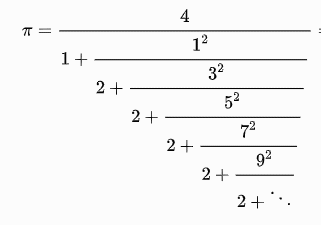


We are looking at the "Harmonic series", namely SumHarmonic(n) = 1 + 1/2 + 1/3 + 1/4 + ... 1/n
def SumHarmonic(n):
total = 0
for i in range(1,n+1):
total += 1/i
return total
def SumHarmonicTotal(total):
so_far = 0
for i in range(1,1000000): # guess this number
so_far += 1/i
if so_far >= total:
return i
def SumHarmonicTotalBetter(total):
# In this version, we won't need to guess
so_far = 0
i = 0
while so_far < total:
i += 1
so_far += 1/i
return i
def SumHarmonicTotal_MuchWorse(total):
# This version finds the answer, but very inefficiently (will take much longer when total > 9). Can you guess why?
n = 1
trial = SumHarmonic(n)
while trial < total:
n += 1
trial = SumHarmonic(n)
return n
| Leibniz |  |
| Wallis | |
| Euler |  |
| Lange (1999) |  |
pi = 3.141592653589793
def Leibniz(teeny):
so_far = 0
i = 1
while abs(pi - so_far) > teeny:
denom = 2 * i - 1
if i % 2 == 1:
so_far += 4/denom
else:
so_far -= 4/denom
i += 1
return i - 1
def Wallis(teeny):
so_far = 1
i = 1
while abs(pi/2 - so_far) > teeny:
numer = (2*i)**2
denom = (2*i-1)*(2*i+1)
so_far *= numer/denom
i += 1
return i - 1
def Euler(teeny):
so_far = 0
i = 1
while abs(pi*pi/6 - so_far) > teeny:
so_far += 1/(i*i)
i += 1
return i - 1
def LangeContFrac(n):
# calculate the continued fraction to the depth n, from the bottom up
frac = 1
for i in range(n,0,-1):
numer = (2*i-1)**2
dfrac = numer / frac
if i == 1:
frac = 1 + dfrac
else:
frac = 2 + dfrac
return 4/frac
def Lange(teeny):
i = 1
while abs(pi - LangeContFrac(i)) > teeny:
i += 1
return i - 1
# print out results for various teeny sizes...
for i in range(1,4):
teeny = 1/10**i
print('teeny:',teeny,'Leibniz:',Leibniz(teeny),'Wallis:',Wallis(teeny),'Euler:',Euler(teeny),'Lange:',Lange(teeny))
teeny: 0.1 Leibniz: 10 Wallis: 4 Euler: 10 Lange: 10
teeny: 0.01 Leibniz: 100 Wallis: 39 Euler: 100 Lange: 100
teeny: 0.001 Leibniz: 1000 Wallis: 393 Euler: 1000 Lange: 1000